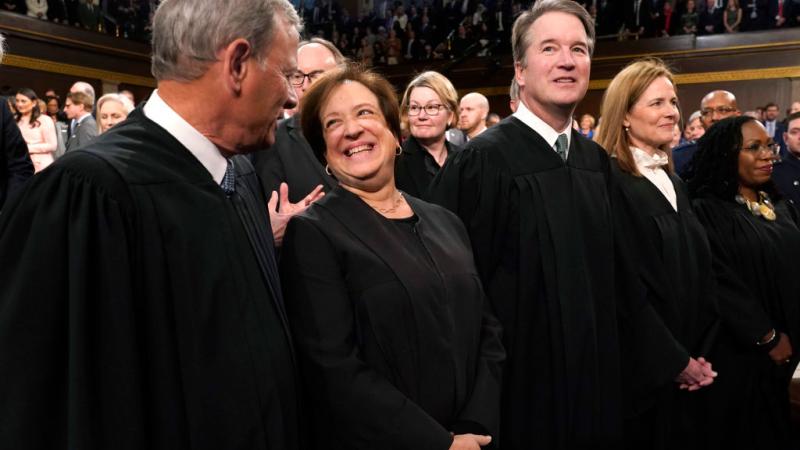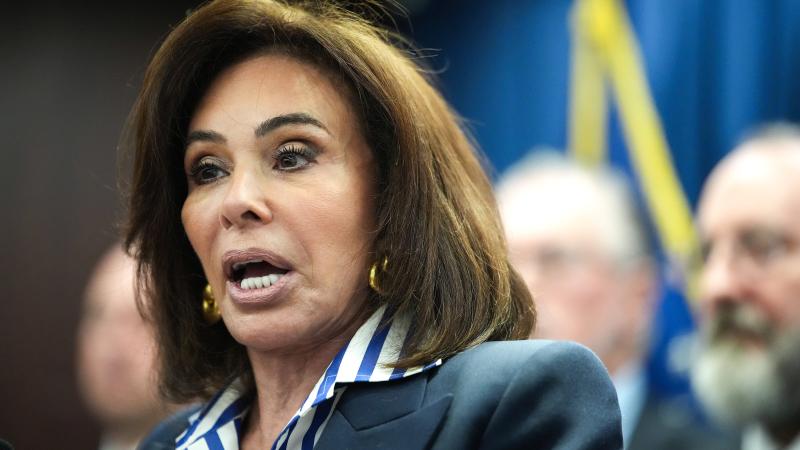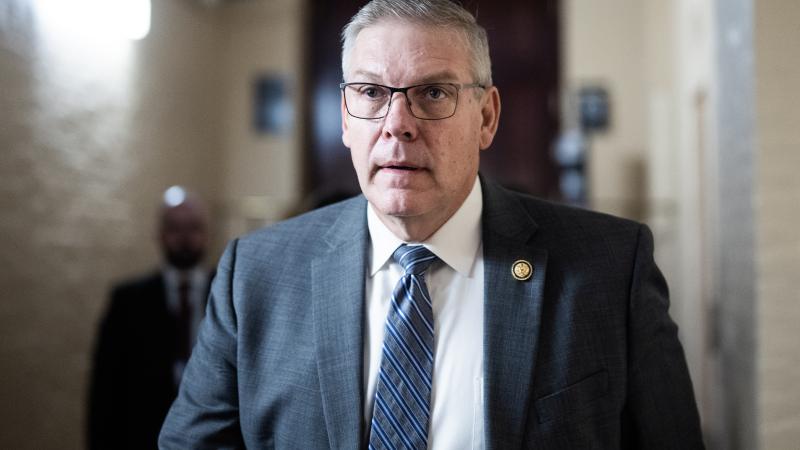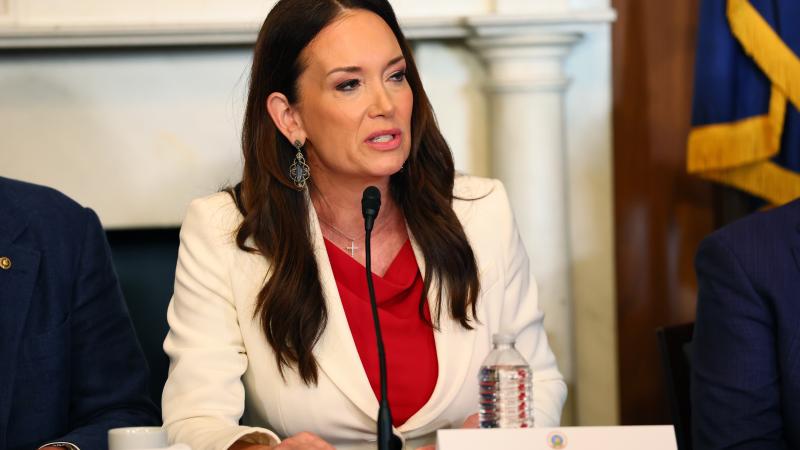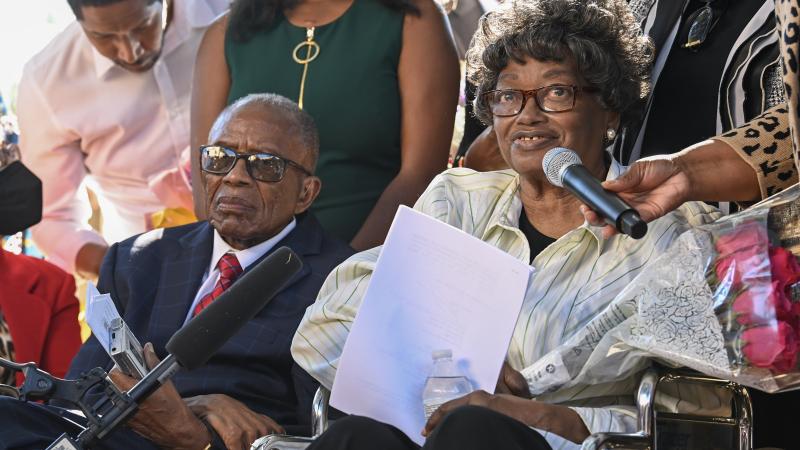CNN reporter-turned-judge minimizes anti-white hostility, strips religious protection from nuns
White professor allegedly driven out of Penn State for his skin color appeals to higher court after Judge Beetlestone finds the school's behavior not "severe or pervasive." Little Sisters of the Poor seem headed to SCOTUS again.
U.S. District Judge Wendy Beetlestone believes that a first-term Trump administration regulation exempting nuns from paying for healthcare plans that cover contraceptives is administratively improper. She also holds that uncontested, repeated shaming of white employees for their race is not "severe or pervasive" enough to create a hostile work environment.
The former BBC and CNN journalist, nominated by President Obama and concurrently serving as chancellor of the University of Liverpool, is now facing two appeals for her rulings four months apart, on the religious employer exemption that undermined her patron's Affordable Care Act and Pennsylvania State University Abington's treatment of Zack De Piero.
The former English professor appealed Beetlestone's April 16 summary judgment for the public university to the 3rd U.S. Circuit Court of Appeals last week, the same day the judge teed up another trip to the Supreme Court for Little Sisters of the Poor by issuing a nationwide injunction against Trump's religious exemption on new grounds.
"This case is positioning itself as a landmark decision that could reshape how courts analyze discrimination claims in academic settings," the Foundation Against Intolerance and Racism, which is sponsoring De Piero's lawsuit, wrote last week.
It will "significantly influence how universities approach diversity initiatives and whether faculty retain the fundamental right to question institutional policies without facing discrimination and retaliation," said the group, cofounded by black intellectuals four years ago.
“For too long, public employers have gotten away with demeaning and discriminating against white employees under the banner of so-called ‘anti-racism,’” said Mountain States Legal Foundation senior counsel James Kerwin, who coauthored the brief.
Religious liberty law firm Becket, representing the nuns, immediately promised to appeal Beetlestone's Aug. 13 ruling, which the judge premised on her brand-new finding – absent from her previous preliminary injunctions, overruled by SCOTUS in 2020 – that the regulation was "arbitrary and capricious" in violation of the Administrative Procedure Act.
“It’s bad enough that the district court issued a nationwide ruling invalidating federal religious conscience rules," lead attorney Mark Rienzi said. (Beetlestone argued the recent SCOTUS precedent against universal injunctions does not apply to the APA.)
"But even worse is that the district court simply ducked the glaring constitutional issues in this case, after waiting five years and not even holding a hearing," Rienzi said.
Becket said the reinstated mandate covers "contraceptives like the week-after pill … including some that can cause abortion," referring to the drug known as ella, whose makers claim will "prevent or delay the release of the egg until all the sperm have died (up to 5 days)."
The Food and Drug Administration's most recent label for ella, in 2021, repeats its 2010 label's warning that it's "possible" the drug can prevent implantation of a fertilized egg, a de facto abortion. It changed the label for a 72-hour pill, Plan B One-Step, in 2022, claiming that "current science supports" the claim it does not affect implantation of an already fertilized egg.
Little Sisters of the Poor, who intervened against the Pennsylvania and New Jersey challenge to the Trump rule, are not immediately vulnerable to Beetlestone's ruling because of a 2018 permanent injunction by a different federal judge that protects the nuns and their insurer, Christian Brothers.
'Slapdash, but consistent, discriminatory efforts'
Half of ex-professor De Piero's lawsuit got the green light from Beetlestone, the telegenic daughter of British-American academics in Nigeria in January 2024, denying PSU Abington's motion to dismiss on the grounds that he had "plausibly alleged that he was subjected to a race-based hostile work environment."
She cited five occasions in which "he was obligated to attend conferences or trainings that discussed racial issues in essentialist and deterministic terms – ascribing negative traits to white people or white teachers without exception and as flowing inevitably from their race," and "emails and interpersonal interactions" that trash and shame whites.
After legal discovery closed, however, Beetlestone determined that "no reasonable jury could determine that the twelve incidents at issue here" met the hostile-environment standard she raised more than a year earlier, "a constant drumbeat of essentialist, deterministic, and negative language." She dismissed his remaining claims a month later.
De Piero's appeal argues the judge ignored SCOTUS precedent that gives faculty even more protection than other public employees to speak on matters of public concern, set an "impossibly high bar" for severe or pervasive discrimination, and excluded "cumulative impact of discriminatory conduct" from the definition of "adverse employment action."
Having "worked extensively with underserved students as a public-school teacher" before getting his doctorate, De Piero had a "promising future at Penn State, before he and his colleagues were charged with learning, internalizing, and operationalizing virulent anti-white rhetoric that fundamentally altered the workplace," the filing says.
He was "targeted with multiple harassment complaints, and pushed out of Penn State altogether," for raising objections on campus and in the media.
From training that singled out white teachers as "a problem," to denunciations of his "white body" as an obstacle to good teaching, and finding he violated workplace rules by complaining "as a white man" and punishing De Piero for objecting to repeated jibes about white faculty, these "essentially undisputed" instances are "far more than enough" to continue the suit.
Beetlestone instead "isolate[d] particular incidents where various co-workers and supervisors made statements denigrating white people" as his "core allegations," the appeal says.
"Along the way," she "impermissibly resolved disputed questions of fact and made credibility determinations" and dismissed his statutory retaliation claim under Title VII of the Civil Rights Act and Pennsylvania Human Rights Act under the wrong legal standard.
The judge bizarrely dismissed his First Amendment retaliation claim "at the pleading stage" by denying that "racial preferences in educational policy and employment, the existence (or not) of present-day 'systemic racism'" and whether "white privilege" is the source of white academic accomplishments are matters of public concern, the filing says.
"Through a combination of slapdash, but consistent, discriminatory efforts," the university implemented the "ideology" of diversity, equity and inclusion and antiracism by "generally denigrat[ing] white people," saying they all have "a racist worldview" and are "unconsciously invested in racism." His own supervisor claimed "reverse-racism isn’t racism."
The appeal said "2020 was a banner year for PSUA’s adoption of overtly racist policies, particularly in the writing program."
The recent unanimous SCOTUS precedent against a heightened standard for majority plaintiffs to demonstrate discrimination proves that "Title VII does not distinguish between Caucasian and non-Caucasian employees," and SCOTUS and appellate precedents going back 50 years confirm the law protects the "emotional and psychological stability" of employees, it says.
De Piero "and other white faculty were subjected to a barrage of racially hostile admonitions, stated as undeniable facts, on an unrelenting basis," the filing says. "De Piero was meant to believe such insults about himself as a condition of his job."
The Facts Inside Our Reporter's Notebook
Videos
Links
- uncontested, repeated shaming of white employees
- former BBC and CNN journalist
- chancellor of the University of Liverpool
- The former English professor appealed
- April 16 summary judgment
- nationwide injunction against Trump's religious exemption
- Foundation Against Intolerance and Racism
- cofounded by black intellectuals
- Mountain States Legal Foundation
- promised to appeal
- Aug. 13 ruling
- overruled by SCOTUS in 2020
- SCOTUS precedent against universal injunctions
- drug known as ella
- most recent label for ella, in 2021
- 2010 label's warning
- 72-hour pill, Plan B One-Step, in 2022
- 2018 permanent injunction by a different federal judge
- telegenic daughter of British-American academics in Nigeria
- denying PSU Abington's motion to dismiss
- Beetlestone determined that "no reasonable jury
- She dismissed his remaining claims
- unanimous SCOTUS precedent
